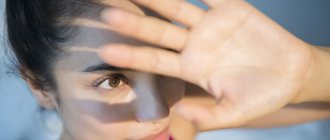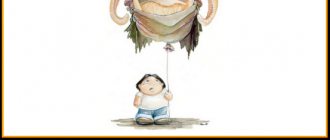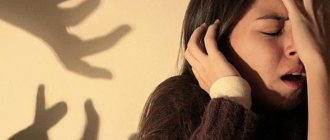Astrophobia is the fear of stars and the starry sky.
Most people are so accustomed to the view of the night sky that they do not pay attention to either the stars or the moon. In the minority are the romantics who are ready to spend hours watching cosmic bodies, and those in whom the sight of the night sky inspires great fear. An anxiety disorder in which a person is terribly afraid of the starry sky is called astrophobia .
How does fear arise?
- If a person is not an astronaut, then the presence of a phobia cannot be associated with a tragic incident that occurred in outer space. However, according to the psychological theory of classical conditioning, panic fear can be triggered by an object that for some reason is associated with an event that caused severe emotional trauma. For example, if during a life-threatening situation a person’s attention is focused on the starry sky, in the future the starry sky can cause great anxiety.
- Too many science fiction films that promote fear of outer space play a significant role in the formation and spread of phobia. The fight against hostile aliens from outer space is the most common plot thread. The effect of feature films is reinforced by popular science programs that tell about cases of abductions by UFO pilots. There is often information that extraterrestrial civilizations control all human activities. Often people are afraid not of the starry sky itself, but of the danger that will come from there. But there is also a fear of seeing something scary.
- Some psychologists associate astrophobia with the perception of one's own self. Fear of space may be due to the fact that a person has too strict internal boundaries.
- It is also possible that the astrophobe was once very frightened while in a large open space.
Even though most people do not experience an irrational fear of the starry sky, many still admit that when looking at the stars they feel a slight oppressive feeling.
Signs of astrophobia
Each patient has his own fears and stories behind them. All this is related to the severity of the disease. Some patients say that they tightly curtain their windows every night because they are afraid of the influence of alien creatures. Patients feel that aliens are directing special laser beams at them to reveal their exact location and then take them home. Patients cannot tell what happens next, since they move their beds to closets or rooms without windows.
Also, when walking in the evening, people suffering from astrophobia wear sunglasses so as not to see the brightness of the stars and not experience fear. Basically, signs of astrophobia are associated with the behavior and well-being of people. Some are afraid to watch films where there are aliens or various cosmic creatures that are taking over our planet and harming people. Others are afraid to be in places that, in their opinion, are suitable for UFO landing.
However, there are also very sick people. These are those who believe that the government knows about the existence of aliens and allows spacecraft to land in special places. Such patients cannot do without a psychiatrist. Speaking about the physical manifestation of the phobia, it must be said that an astrophobe may have twitching of the arms and legs, increased sweating, and an inability to control their emotions and actions. If, with such symptoms, the patient is not at home, but in an unfamiliar room, then he may, in a fit of fear, simply lose his bearings, get lost and go crazy.
Consequences of phobia and treatment
On the one hand, astrophobia does not greatly limit the life of a modern person. An anxiety disorder does not prevent you from achieving success and communicating with people. But with this phobia, a person deliberately excludes an entire science from his life - astronomy, and many scientific discoveries and interesting facts are associated with it. Photographs of the starry sky, planetariums and museums become inaccessible to humans.
When treating this type of phobia, NLP (neurolinguistic programming) techniques and hypnotherapy are most often used.
Treatment of astrophobia
There is an opinion that astrophobia is not a disease at all and does not require treatment. There are reasons for this. First of all, this is explained by the fact that if a person is not an astronaut, has nothing to do with space and its study, then he should simply stay away from films or any facts concerning the sky and its components. He needs to understand that everything is happening somewhere far away and cannot in any way influence or threaten his life. However, if you look at this disease with a sober look, then everything will not be so smooth. Because of astrophobia, a person cannot live a full life.
He is unable to visit museums or planetariums, refuses to take part in various holidays, such as Halloween, and does not watch TV at all. Thus, he misses many interesting events in life. Fortunately, nowadays there are a large number of drugs and techniques that allow you to get rid of various phobias. What exactly to choose and how to treat, the doctor determines only after examining the patient. But in particularly difficult cases, the disease cannot be cured with drugs alone, so doctors have to prescribe tranquilizers and sedative pills to patients.
As for astrophobia, psychologists most often use treatment methods such as; NLP technique, psychotherapy, and hypnotherapy, which is popular today. Although many patients are distrustful of hypnosis, this method can be considered almost the most effective and efficient. Please take into account that the sooner you identify the signs of an existing phobia and consult a specialist, the sooner you can get rid of your fears and return to a full life.
Starry sky and survival
The starry night sky has never brought harm to a person, but it has always helped to survive. By observing the location of the stars, sailors determined the cardinal directions and their location . Zodiacal constellations helped to compile fairly accurate solar calendars, which were very important for agriculture.
With the advent of a large number of modern navigation systems, people no longer need to look at the sky. However, even now the stars can save a person’s life. The starry sky is a faithful assistant to a traveler who has lost his bearings and is caught in the wild at night. Any modern navigation device can fail or get lost, but the starry sky will never let you down
Signs of obsessive fear of the sky
Astrophobia manifests itself with almost the same symptoms as most other obsessive disorders. Most often, the disease reminds itself at night. A person cannot sleep with uncurtained windows. It seems to him that thousands of aliens are looking at him from the distance of the stars, pointing their powerful laser weapons at him and preparing to descend to Earth to capture humanity.
To some, such reasoning seems senseless and ridiculous, but for those who suffer from astrophobia, these experiences haunt them. The feeling of obsessive fear causes the following symptoms in a person:
- increased breathing up to shortness of breath;
- heartbeat;
- dizziness;
- nausea;
- increased sweating;
- uncontrollable emotions;
- numbness in the limbs, inability to control your body;
- panic attacks.
The most severe stage of astrophobia manifests itself in completely ridiculous symptoms. Sick people are sure that the highest-ranking officials of countries know about secret space stations where ships and UFOs are landing for secret developments. In these cases, you have to overcome the phobia together with a psychiatrist.
When should you seek treatment?
If self-help is not successful, the anxious reaction of astrophobes in front of the stars grows and leads to panic attacks, and their frequency does not allow the person and those around them to live a normal life, in this case the help of a specialist will be required.
Sometimes the phobia, due to the patient’s isolation, does not allow him to come to the hospital on his own. Therefore, you can use the following expert advice:
- Call a doctor home.
- Take the online examination.
- Invite a friend or close relative with you to visit the doctor.
What treatment methods are used?
Since there is no single cause of astrophobia, there is also no single treatment for it. It is developed individually and may include:
- Exposure therapy is one of the most common forms of treatment for people with astrophobia.
The therapist begins treatment by showing the patient photographs of stars and celestial space, and eventually gradually invites him to observe real stars. This will desensitize the patient's fear. - Cognitive behavioral therapy (CBT) is a psychosocial intervention aimed at improving mental health. This is a technique that is often used to treat people suffering from anxiety disorders such as generalized anxiety disorder and OCD.
- Dialectical Behavior Therapy (DBT) is a very effective form of treatment for astrophobes.
- Meditation , which helps people enter a more balanced state.
- Yoga . There are many different yoga poses that can help an astrophobe. It can be considered as meditation in motion.
Note! Medications are only prescribed by a psychiatrist for people suffering from severe astrophobia with panic attacks. These include antidepressants that may help when combined with other forms of therapy.
Prevention of development and exacerbations
An astrophobe may have symptoms of fear and anxiety for a long time, but preventative methods can return him to a full life.
Therapy to prevent the occurrence of phobias is carried out in several areas:
- Education, know the cause and factors of concern and methods of responding to neutralize them.
- Control of thoughts and actions.
- Ability to recognize the first signs of a panic attack and take appropriate measures.
- Managing physical phobic symptoms such as chest pain, rapid heartbeat, excessive sweating, dizziness, or difficulty breathing.
Symptoms
People with astrophobia try to avoid any space topics.
Even the most innocuous thought about space aliens, ships and planets can lead to a full-blown panic attack. Some of them try not to leave the house at night so as not to see the starry sky. Space themes can cause the following physical symptoms in an astrophobe:
- increased heart rate, high blood pressure, shortness of breath, and chest pressure;
- sweating and drowsiness;
- dizziness, fatigue and confusion;
- nausea and lack of appetite;
- dry mouth and severe ringing in the ears.
Separately, the following psychological symptoms are noted when a panic attack occurs in an astrophobe:
- irritability;
- fear of losing control;
- mood swings;
- fear of death;
- feeling of helplessness.
Who is predisposed?
People with a genetic or family predisposition to anxiety may be at high risk of developing this type of phobia. Impressionable dreamers and supporters of “conspiracy theories” are no less susceptible to fear.
The degree of response will be greatly influenced by individual life experiences - the number and duration of events that cause panic attacks.
On a note. Age, socioeconomic status and gender also have an impact for this type of phobia. For example, women and children suffer more from astrophobia, while childhood star phobias often go away on their own when the child reaches adolescence.
Reasons for development
As with other specific phobias, factors such as PTSD, family history and negative experiences can contribute to the development of this fear, especially if the imagination is strong.
For example, watching scary movies or TV shows about space, or tragic history of space development, such as the explosions of the Challenger and Columbia spacecraft. As with many phobias, astrophobia does not have one source of fear.
Scientists believe that many different factors play a role in anxiety disorders. Experts in the field of psychiatry identify the following etiological models of the disease:
- Genetic - people inherit fears and phobias from their close relatives. Brain cells (neurons) release certain chemicals called neurotransmitters.
- Psychotraumatic - a person has experienced trauma in early childhood or as an adult, for example, while watching a movie or reading a book, visiting a planetarium, or having a traumatic experience at night.
- Behavioral - Irrational fear of the stars and the sky can be caused by behavior learned through replication, when children copy the behavior of family members.
- Professional - relatives of astronauts worry about them, and therefore perceive space as a threat. And the astronauts themselves may develop fear after an unsuccessful flight.
Diagnosis of pathology
A person suffering from astrophobia essentially ceases to exist in everyday life, because he loses all hope of getting out of this condition.
In this situation, he will need the help of a specialist. At the first stage, this may be the attending physician, who will give a referral to a specialized specialist. The diagnosis of astrophobia can only be made after a thorough examination, questioning and examination. During the examination, symptoms should be identified and medical and family history examined.
To diagnose this type of phobia, the following signs must be present:
- Intense fear or anxiety about a specific space object.
- A phobic object or situation always causes panic fear.
- The patient tries to avoid meeting such an object.
- Disproportionate fear of real danger.
- Violation in social, professional or other areas of life.
- Persistent phobias last more than six months.
Important! A psychotherapist and psychiatrist should rule out other possible phobic conditions that may contribute to a panic attack, such as generalized anxiety disorder (GAD) and other specific phobias, including claustrophobia.










